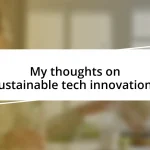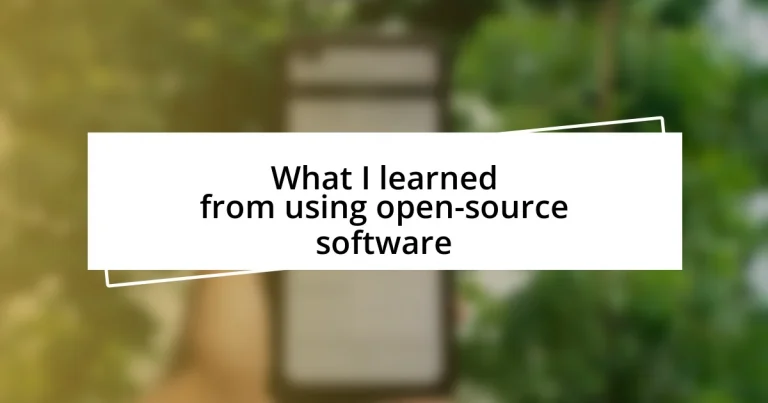Key takeaways:
- Open-source software fosters collaboration, creativity, and a supportive community, transforming technology into a communal experience.
- Key benefits of open-source include cost-effectiveness, flexibility for customization, and strong community support, enhancing the learning environment.
- Contributing to open-source requires active participation, starting small, and appreciating others’ efforts, reinforcing a culture of collaboration and continuous growth.
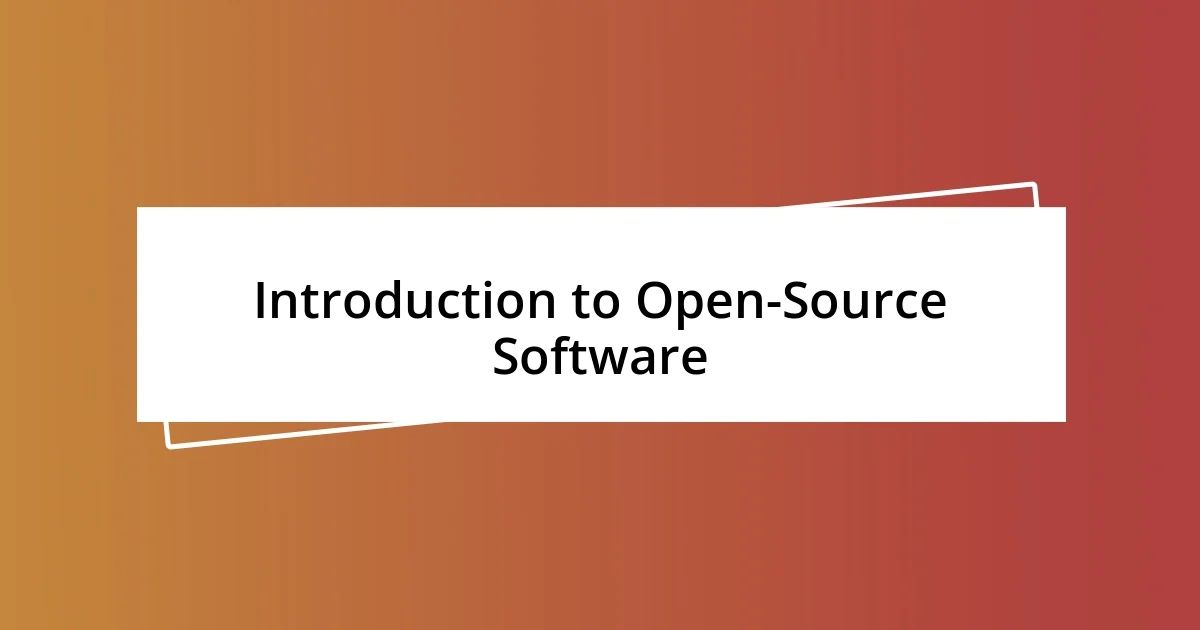
Introduction to Open-Source Software
Open-source software is a game-changer in the technology landscape. It allows anyone to access, modify, and distribute the source code, which fosters collaboration and innovation. I remember the first time I stumbled upon an open-source project; it felt like finding a treasure trove of creativity where everyone was welcome to contribute.
When I dived deeper into the world of open-source, I was surprised by the sense of community it nurtured. This wasn’t just software; it was a collection of shared dreams and collective problem-solving. Have you ever felt the thrill of collaborating with others who have the same passion? For me, it transformed the way I viewed technology—not just as tools, but as collaborative platforms.
I’ve often met people who were hesitant about using open-source software, fearing it might be inferior or overly complicated. Yet, in my experience, many of these projects are backed by passionate developers who pour their heart into making them robust and user-friendly. It’s not just about software; it’s about being part of a vibrant ecosystem that encourages learning and growth.
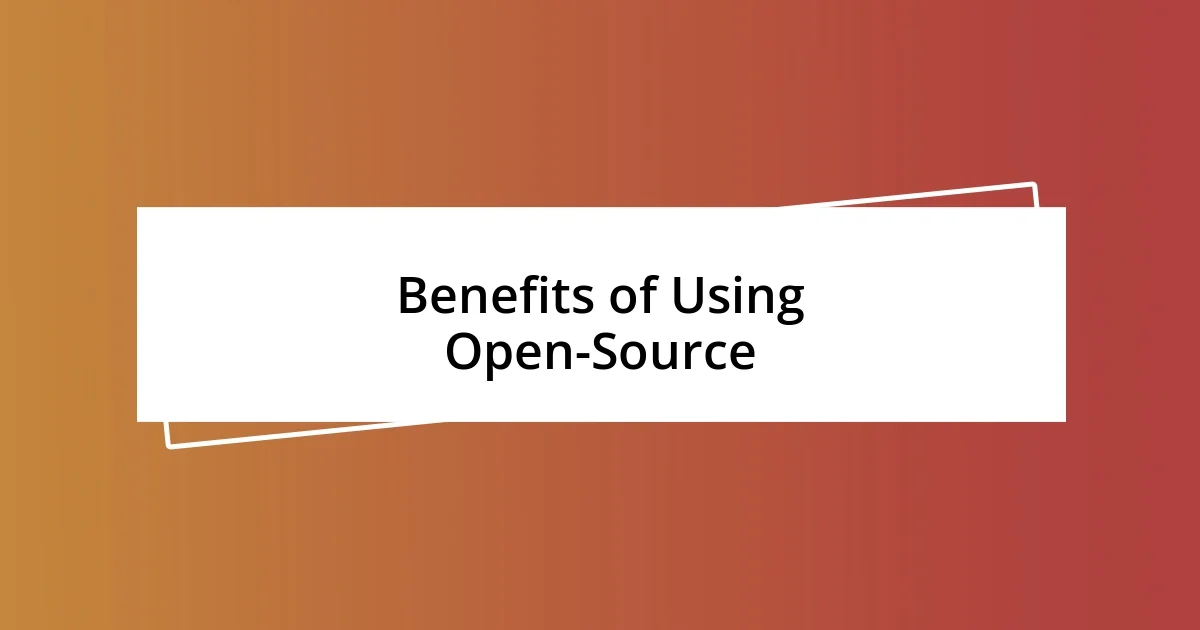
Benefits of Using Open-Source
The benefits of using open-source software are quite compelling. One of the standout advantages I’ve experienced is the incredible cost-effectiveness it offers. When I first began using open-source programs, I was astonished at the breadth of high-quality tools available without any licensing fees. This access allowed me to experiment and learn without the financial pressure, enabling me to focus on improving my skills and completing projects that would have otherwise been out of reach.
Moreover, the flexibility and customization that come with open-source software really resonate with me. Unlike proprietary software, which often feels rigid and restrictive, open-source solutions allow users to tailor the software to their specific needs. I recall a project where I needed a particular feature that wasn’t available out of the box. Diving into the code not only allowed me to implement it but also taught me so much about coding practices and software architecture along the way.
Lastly, the community support surrounding open-source software is something I deeply appreciate. Whenever I encountered a problem, I found a wealth of resources, tutorials, and forums brimming with enthusiasts ready to help. This kind of collaborative spirit is often hard to find with paid software, where user support can feel more transactional. I found it rewarding to connect with others who shared similar challenges and passions, creating a learning environment that felt far more engaging and supportive.
| Benefits | Description |
|---|---|
| Cost-Effective | No licensing fees, allowing for budget-friendly options. |
| Flexibility | Customizable solutions that meet individual needs. |
| Community Support | A collaborative environment rich with resources and enthusiastic users. |
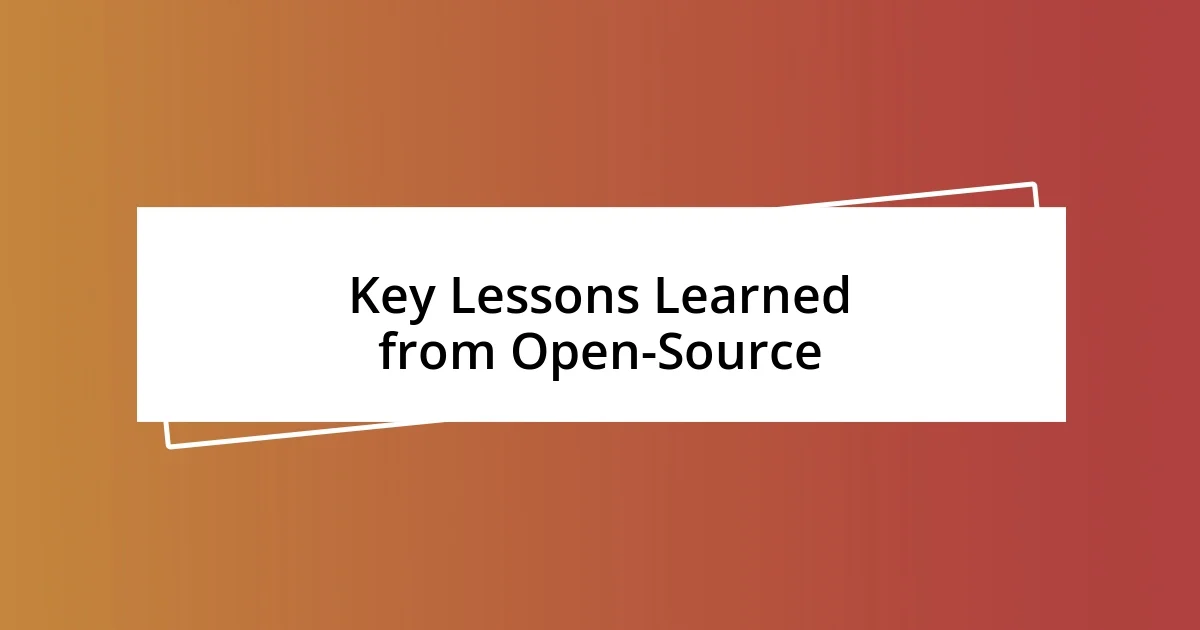
Key Lessons Learned from Open-Source
When I think back on my journey with open-source software, a few key lessons stand out. One lesson that resonated deeply with me is the importance of collaboration. I vividly recall the late nights spent tinkering with a project alongside contributors from different corners of the globe. This experience taught me that differing perspectives can spark innovative solutions, transforming a simple idea into something much grander.
- Collaboration brings diverse perspectives.
- Learning is a continuous and communal experience.
- Documentation is a powerful tool for knowledge sharing.
Another crucial insight I’ve gained is the significance of adaptability. I’ve navigated unexpected challenges while using open-source tools, like a particularly stubborn bug I faced in a project that seemed insurmountable. Rather than feeling defeated, I learned to lean on the community and engage in discussions, which ultimately led to an unexpected breakthrough. This taught me that obstacles are just stepping stones for learning and growth.
- Embrace the challenges—each one is a learning opportunity.
- Engage actively with community resources.
- Adaptability is key to overcoming hurdles.
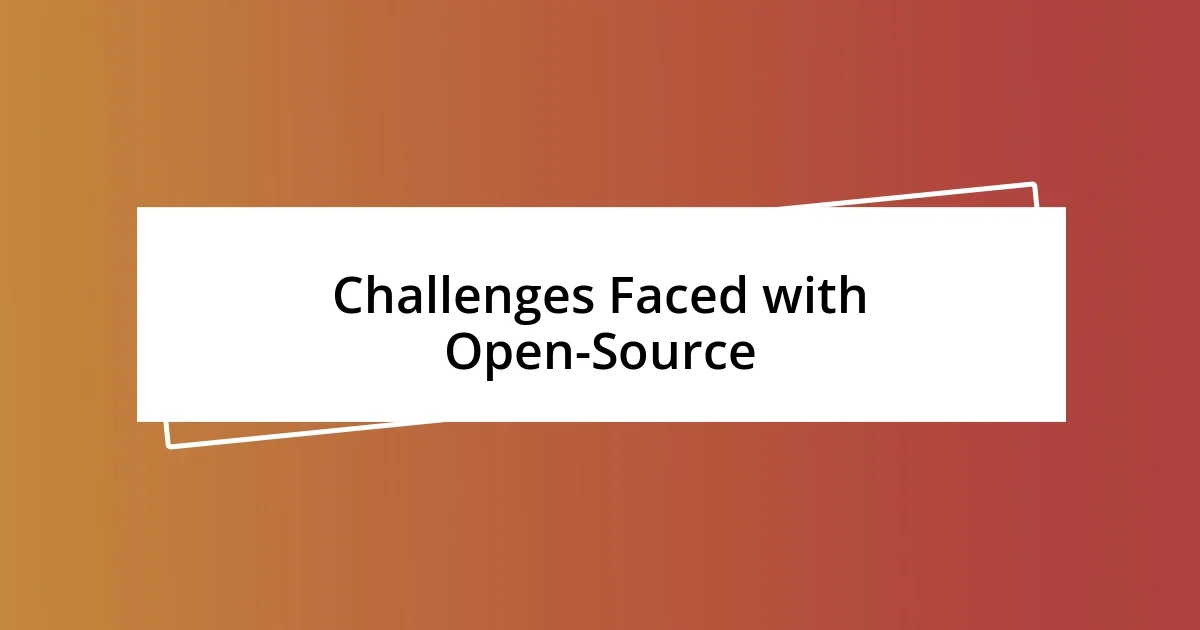
Challenges Faced with Open-Source
When I first ventured into open-source software, I quickly realized that, while the benefits were numerous, the challenges were equally significant. A major hurdle I faced was the steep learning curve. I remember diving into a project only to be overwhelmed by insufficient documentation or unclear instructions. Have you ever found yourself stuck in a loop of confusion, trying to piece together what you’re missing? It can be frustrating, but I learned to reach out to the community for guidance, which often provided insights that weren’t available in the manuals.
Another issue that surfaced consistently was compatibility. There were moments when I was excited to implement a new tool, only to find it didn’t work well with the existing software I was using. For instance, integrating a new database system with the application I’d developed led to all sorts of compatibility nightmares. I could feel the tension rise as I navigated dependency conflicts, but I soon discovered that digging into the forums and tracking down user experiences could pave the way to solutions. It’s a reminder that every challenge offers a chance to deepen our understanding of the system’s intricacies.
Security is also a critical concern with open-source software—one that often kept me awake at night. I learned the hard way how vulnerabilities can creep in during customizations or updates. During a project, I had to address a security flaw that left my application exposed, which was a stark wake-up call. I often ask myself, what could I have done to mitigate this risk earlier? This experience taught me that while the openness of the code can be liberating, it also requires a diligent, proactive approach to maintain security and protect my work.
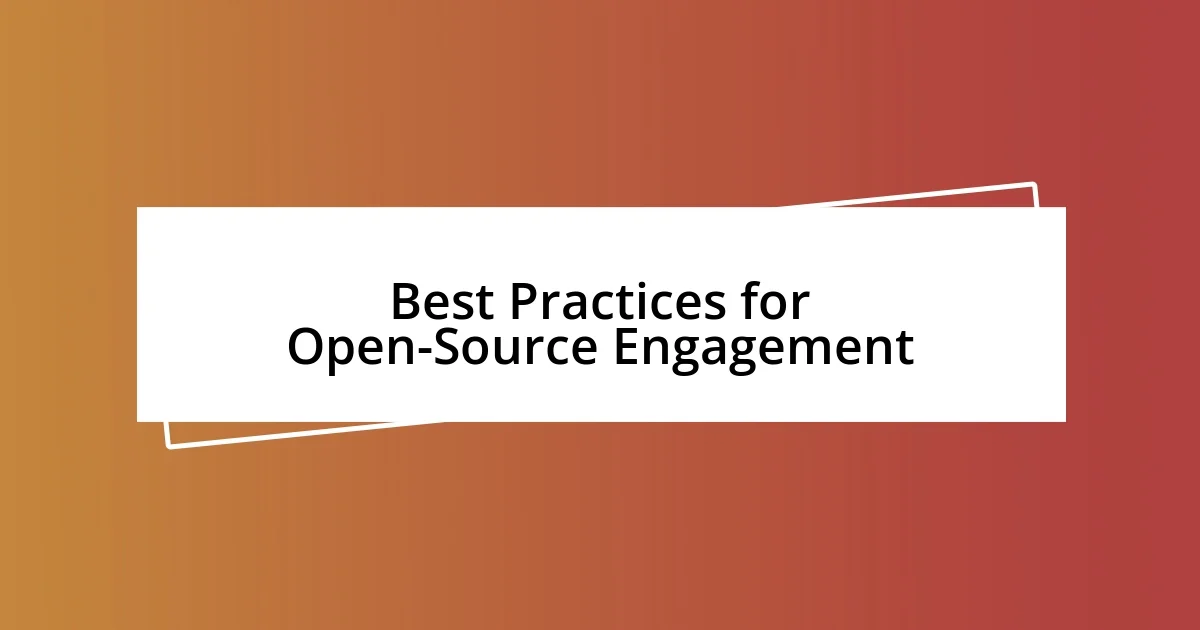
Best Practices for Open-Source Engagement
Engaging with open-source software effectively requires commitment, and one of the best practices I’ve uncovered is to become an active participant in community discussions. I remember sitting in a chat room, hesitant to share my thoughts, when someone posed a question that mirrored my confusion. I took a leap of faith and contributed, and to my surprise, not only was my input welcomed, but it also sparked a lively discussion that clarified several points for me. Does that resonate with you? Sharing our experiences and challenges can create a supportive atmosphere where learning thrives.
Another essential practice is to contribute back to the projects you benefit from, even in small ways. I once fixed a typo in a project’s documentation, thinking it was a tiny contribution, but later received heartfelt gratitude from the maintainers. It struck me how meaningful even small acts can be in the open-source world. Have you ever thought about how a little effort can create a ripple effect? It’s these tiny gestures that build a robust community and foster collaboration, reinforcing the idea that we’re all in this together.
Lastly, expressing appreciation for others’ efforts can have a profound impact. There were times when I felt overwhelmed while working on a challenging feature, and a simple ‘thank you’ to someone who had provided helpful feedback lifted my spirits. It reminded me that open-source isn’t just about code; it’s about the people who contribute their time and knowledge. How often do we acknowledge the hard work of others? Making it a habit can go a long way in strengthening relationships and encouraging a spirit of collaboration in the community.
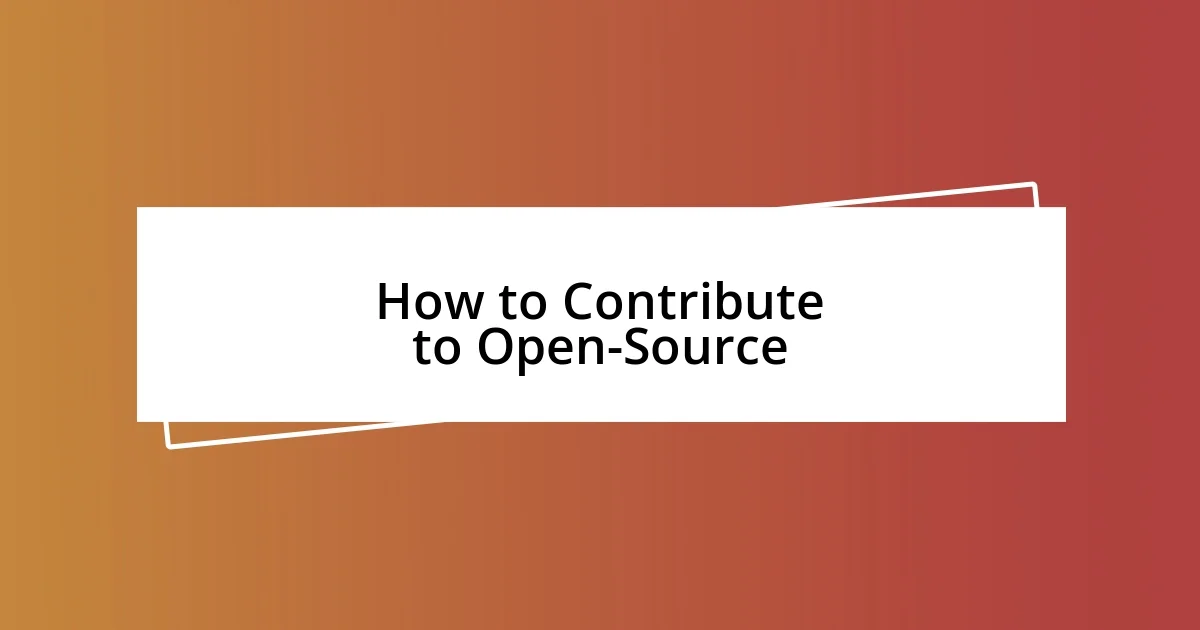
How to Contribute to Open-Source
Contributing to open-source software starts with finding a project that resonates with you. For me, it was a community-driven tool aimed at improving productivity. I remember spending evenings poring over the codebase, feeling both excitement and apprehension as I discovered areas where I could help. Have you ever felt that rush of curiosity mixed with a bit of fear? It’s a powerful motivator. By understanding the project’s goals and challenges, I felt more equipped to make meaningful contributions.
Once you’ve settled on a project, don’t hesitate to start small. I recall my first contribution was a simple code fix that seemed trivial at the time. But when the maintainers accepted my pull request, I was elated. It made me realize that no contribution is too small; every bit helps build a better tool for everyone. Have you considered how even a minor tweak can enhance someone else’s experience? I encourage you to dive in and share your talents, no matter how modest they may seem.
Active participation in community channels is another vital aspect of open-source contribution. I was apprehensive to pose questions or express my views initially, but when I finally chimed in, it led to conversations that enriched my understanding of the project. Have you found yourself holding back in discussions? It’s natural, but embracing your voice can unlock invaluable connections. Remember, we’re all learners and contributors in this space, and your insights might just spark the next great idea.










